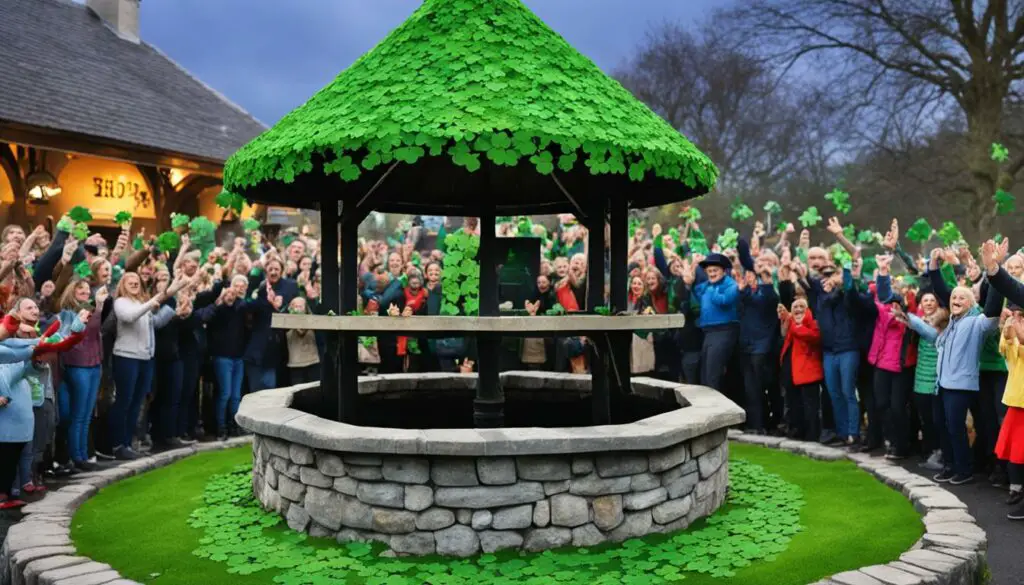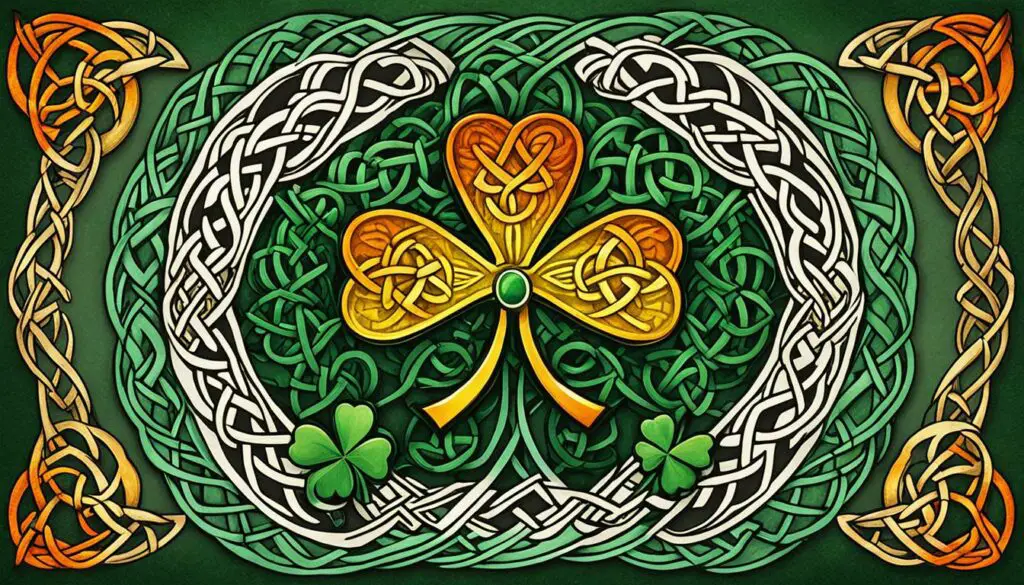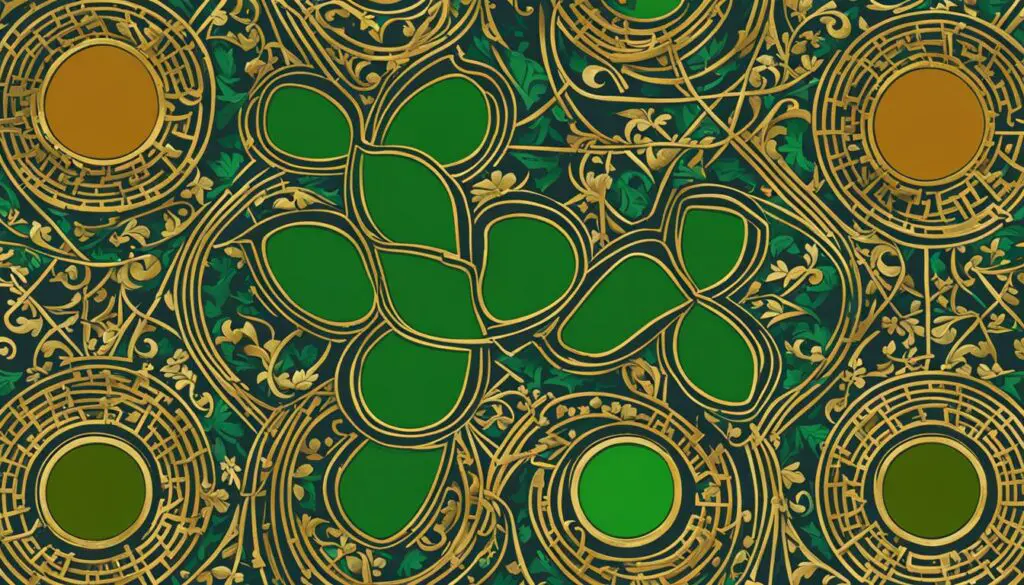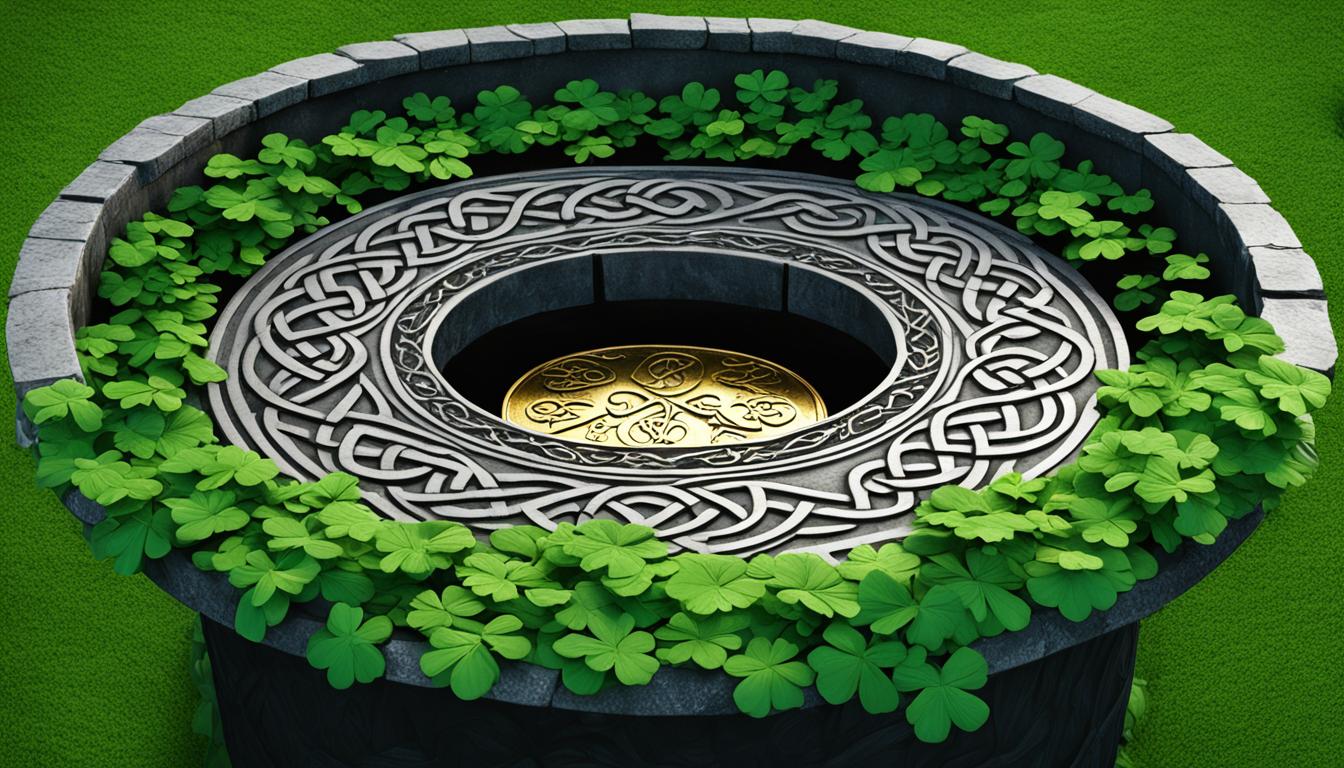In Irish culture, expressing good luck and well wishes is a cherished tradition. If you’re curious about how to say “good luck” in Irish, you’ve come to the right place. We’ll explore the Irish phrase for good luck and delve into its meaning and usage.
Key Takeaways:
- The Irish phrase for “good luck” is “Go n-éirí leat!”
- It translates to “may you succeed!”
- Another variation for wishing good luck to a group is “Go n-éirí libh!”
- Irish blessings and phrases for good luck hold significance in Irish culture
- Incorporating Irish well-wishes into St. Patrick’s Day celebrations adds a touch of Celtic charm
The Meaning Behind “Go n-éirí leat!”

When it comes to wishing someone good luck in Irish, the phrase “Go n-éirí leat!” holds significant meaning. This heartfelt expression is commonly used and translates to “may you succeed!” in English. To understand the phrase better, let’s break it down:
- Go n-éirí: This part of the phrase means “will succeed” and emphasizes the desire for a positive outcome or achievement.
- Leat: This word represents the person being wished success, indicating that good fortune is being directed towards them.
When the two parts are combined, the result is a warm and genuine wish for someone’s success and good luck. “Go n-éirí leat!” is a powerful expression that encapsulates the hope for favorable outcomes and positive experiences.
The Significance of “Go n-éirí leat!”
“Go n-éirí leat!” is a familiar phrase in Irish culture, often used to express well wishes and convey good luck. It is a genuine and heartfelt way to let someone know that you are rooting for their success and hoping for positive outcomes in their endeavors.”
As seen in the image above, “Go n-éirí leat!” is an authentic Irish expression that carries the essence of the Irish cultural values and beliefs. This phrase reflects the warmth and sincerity with which the Irish people express their good wishes and send positive energy to others.
Examples of Usage
“Go n-éirí leat!” can be used in various contexts where good luck is being wished. Here are some examples:
- Wishing a friend good luck before an important exam: “Best of luck on your exam! Go n-éirí leat!”
- Sending well-wishes to a loved one starting a new job: “Congratulations on your new job! Go n-éirí leat!”
- Wishing a colleague success on a project: “Good luck with your project! Go n-éirí leat!”
By using “Go n-éirí leat!”, you can convey your genuine wishes for someone’s success and good fortune in any situation. The phrase captures the essence of Irish culture and offers a warm and uplifting way to show support and encouragement.
| Irish Phrase for Good Luck | English Translation |
|---|---|
| “Go n-éirí leat!” | “May you succeed!” |
| “Ádh mór ort/oraibh!” | “Good luck!” |
| “Go n-éirí an t-ádh leat!” | “That luck may rise with you!” |
The table above showcases some additional Irish phrases for good luck. These expressions can be used interchangeably with “Go n-éirí leat!” to convey well wishes and positive energy to others.
Next, we’ll explore how to wish good luck to a group of people in Irish, providing you with even more ways to spread positivity and blessings.
Wishing Good Luck to a Group of People

If you want to wish good luck to a group of people, you can use the phrase “Go n-éirí libh!” in Irish. This phrase is similar to “Go n-éirí leat!” but is used when addressing multiple individuals. It means “may you (all) succeed!” and is a way to convey good luck and well wishes to a group. Another variation you might come across is “Ádh mór ort/oraibh,” which can also be used to wish someone good luck or good fortune.
If you find yourself in a situation where you want to offer your best wishes to a group of people, whether it be for a shared endeavor, an important event, or simply in general, using these Irish phrases will add a touch of warmth and cultural flair to your well wishes.
Examples:
“Go n-éirí libh!” – May you (all) succeed!
“Ádh mór ort/oraibh!” – Good luck to you (all)!”
Celebrate the spirit of togetherness and show your support by sending good luck wishes to a group in a language rich with culture and tradition.
Now, let’s take a closer look at the significance of St. Patrick’s Day and the Irish blessings that are often shared during this festive time.
Other Ways to Wish Good Luck in Irish
While “Go n-éirí leat!” is the most common way to wish good luck in Irish, there are other phrases you can use to convey your well wishes. Here are a few examples:
- Ádh mór ort/oraibh – This phrase also means “good luck” and is another way to express your positive wishes.
- Beannacht Dé ort/oraibh – Translated as “May God’s blessing be upon you” or “God bless you,” this phrase is often used to wish good luck and good fortune.
- Comhghairdeas – While this word primarily means “congratulations,” it can also be used to wish someone good luck on their endeavors.
- Rath Dé ort/oraibh – Meaning “God’s grace upon you,” this phrase is used to convey good luck and blessings.
Examples in Irish:
Irish: Ádh mór ort/oraibh!
English: Good luck!Irish: Beannacht Dé ort/oraibh!
English: God bless you!Irish: Comhghairdeas!
English: Congratulations!/Good luck!Irish: Rath Dé ort/oraibh!
English: God’s grace upon you!/Good luck!
These expressions provide alternative ways to wish someone good luck and convey positive energy. You can choose the phrase that resonates most with your intentions and use it to share your well wishes in Irish.
Other Ways to Wish Good Luck in Irish
| Irish Phrase | English Translation |
|---|---|
| Ádh mór ort/oraibh | Good luck |
| Beannacht Dé ort/oraibh | God bless you |
| Comhghairdeas | Congratulations/Good luck |
| Rath Dé ort/oraibh | God’s grace upon you/Good luck |
The Significance of St. Patrick’s Day and Irish Blessings

St. Patrick’s Day holds great significance in Irish culture, serving as a time when Irish blessings and well wishes are shared among friends, family, and communities. Irish blessings are renowned for their warmth, sincerity, and ability to convey good luck and good fortune. They provide a beautiful way to celebrate and honor Irish traditions and culture, as well as to extend heartfelt wishes to others. While specific blessing phrases may differ, the overarching sentiment of wishing someone well and hoping for their success is a common thread in Irish blessings and expressions for good luck.
“May the road rise up to meet you.”
Irish blessings often carry a sense of hope and optimism for the recipient’s journey through life. A popular blessing conveys the wish that the road they traverse is always smooth and prosperous. This sentiment encapsulates the desire for success and good fortune, emphasizing the importance of the individual’s path and the positive experiences it may offer.
Another common Irish blessing is:
“May your blessings outnumber the shamrocks that grow, and may trouble avoid you wherever you go.”
This blessing celebrates abundance and good luck, conveying the hope that the recipient’s blessings will surpass the countless shamrocks in Ireland. It also conveys a desire for the individual to be free from hardship and obstacles as they journey through life. By invoking the imagery of shamrocks, a symbol associated with Ireland and St. Patrick’s Day, the blessing holds deeper cultural significance.
Irish blessings encompass various aspects of life, including family, love, and good health. They are often recited during occasions such as weddings, birthdays, and holidays, including St. Patrick’s Day. These blessings serve as expressions of love, support, and well-wishes for others, fostering a sense of unity and celebrating the shared values and traditions within Irish culture.
Irish blessings exhibit the timeless charm and profound impact of the Irish language with their poetic words and heartfelt sentiments. They offer a way to convey good fortune, express genuine care, and spread positivity in a unique and culturally rich manner. Incorporating these blessings into celebrations and everyday interactions allows individuals to embrace the warmth, tradition, and enduring spirit of Ireland.
| Irish Blessing | Translation |
|---|---|
| May the road rise up to meet you. | May your journey be smooth and successful. |
| May your blessings outnumber the shamrocks that grow, and may trouble avoid you wherever you go. | May you have abundant blessings and be free from hardships. |
| May your heart be light and happy, may your smile be big and wide, and may your pockets always have a coin or two inside. | May you experience joy, prosperity, and good fortune throughout your life. |
| May your troubles be less and your blessings be more, and nothing but happiness come through your door. | May you encounter fewer troubles and experience increasing blessings and happiness. |
| May you live as long as you want and never want as long as you live. | May you enjoy a long life filled with contentment and abundance. |
The Influence of St. Patrick on Irish Culture and Language

St. Patrick, the patron saint of Ireland, had a profound impact on Irish culture and language. His role in converting the people of Ireland to Christianity is widely acknowledged, and he is also famously associated with banishing all snakes from the island. The influence of St. Patrick can be seen in various aspects of Irish daily life, including language, traditions, and expressions for good luck.
Irish culture is deeply intertwined with religious references and practices, largely shaped by St. Patrick’s teachings. The legacy of his missionary work and the values he imparted have endured throughout the centuries, becoming integral to the Irish identity. As a result, expressions for good luck in the Irish language often incorporate references to blessings and positive outcomes, reflecting the strong influence of St. Patrick and his teachings.
Through St. Patrick’s influence, the Irish language developed a rich vocabulary for expressing well wishes and luck. These Irish expressions for good luck encapsulate the culture’s reverence for blessings and positive outcomes. They serve as a reminder of the values imparted by St. Patrick and his profound impact on the Irish nation.
The Significance of St. Patrick’s Day
“St. Patrick’s Day is a time when the Irish celebrate their heritage and honor St. Patrick’s teachings. It is a day marked by festivities, parades, and cultural events, with people coming together to embrace their Irish identity and pay tribute to their patron saint.” – Irish Cultural Society
St. Patrick’s Day holds immense significance in Irish culture, serving as a time to celebrate and honor St. Patrick’s teachings. It is a day when Irish blessings and well wishes are commonly shared, reflecting the influence of St. Patrick on the Irish people’s mindset.
Irish blessings, often recited on St. Patrick’s Day, are known for their warmth and sincerity. They offer a way to convey good luck, good fortune, and positive energy. These blessings are deeply rooted in the Irish culture and express the desire for success, prosperity, and happiness in the lives of those to whom they are extended.
In summary, St. Patrick played an influential role in shaping Irish culture, language, and expressions for good luck. His teachings and influence are evident in the religious references, traditions, and well wishes deeply ingrained in Irish daily life. By embracing St. Patrick’s legacy, the Irish people have maintained strong ties to their cultural heritage while spreading the warmth and positivity of Irish blessings to people around the world.
The Symbolism of Luck in Irish Culture

Luck holds great significance in Irish culture, and there are countless phrases that express good luck and well wishes. One phrase commonly used is “Go n-eirí an t-ádh leat” which translates to “That luck may rise with you!” Another well-known phrase is “go n-éirí an bóthar leat,” which means “may the road rise up to greet you.” These phrases convey the wish for good fortune and success. It’s interesting to note that while the four-leaf clover is often associated with luck in Irish culture, the harp is the official symbol of the Republic of Ireland.
In Irish culture, luck is believed to bring blessings and positive outcomes. It is a cherished concept that is deeply intertwined with Irish traditions and values. The Irish language is rich with expressions and phrases that convey good luck and well wishes to others.
The Power of Irish Blessings
“May luck be with you on life’s journey, guiding you along the way.”
Irish blessings encapsulate the significance of luck in Irish culture. They offer a heartfelt and sincere way to wish someone well, conveying the hope for good luck and success in all aspects of life. These blessings often contain poetic imagery and profound messages, creating a sense of warmth and positivity.
The Four-Leaf Clover and Other Symbols of Luck
“Finding a four-leaf clover is said to bring immense luck and good fortune.”
The four-leaf clover has long been associated with luck in Irish culture. It is believed that finding this rare clover brings immense luck and good fortune. Each leaf represents a different aspect of luck – faith, hope, love, and luck itself. The four-leaf clover has become a recognized symbol of Irish luck worldwide.
Aside from the four-leaf clover, other symbols of luck in Irish culture include the horseshoe, the Celtic knot, and the Claddagh ring. These symbols are often incorporated into jewelry, artwork, and decorations as a way to embrace and celebrate the power of luck in Irish tradition.
Embracing Luck in Daily Life
“May the luck of the Irish always be with you!”
Wishing someone luck is a common practice in Irish culture. Whether it’s before an important event, a job interview, or simply to convey well wishes, the Irish people believe in the power of luck to bring positive outcomes. By embracing luck as an integral part of daily life, the Irish cultivate a sense of optimism and are always ready to offer their heartfelt wishes for good luck to others.
So, next time you want to wish someone well, think of the Irish phrases for good luck and embrace the symbolism of luck in Irish culture. “Go n-eirí an t-ádh leat” or “may the luck of the Irish be with you” – these phrases not only convey your good wishes but also evoke the rich heritage and traditions of Ireland.
Toasting and Wishing Good Health in Irish

In Irish culture, toasting and wishing good health are closely tied to expressions for good luck. When toasting, the Irish word for cheers is used, which is sláinte. This word is used to wish someone good health and can be used as a way to convey good luck and well wishes.
Additionally, the phrase Go raibh míle maith agat! which means thank you very much, is often used as a way to send a blessing and wish for good fortune to the person being thanked.
The Importance of Toasting in Irish Culture
In Irish culture, toasting is a cherished tradition that brings people together to celebrate and express good wishes. Whether it’s a wedding, a birthday, or a simple gathering, toasting symbolizes unity and shows appreciation for the present moment. By toasting with the word sláinte, which encompasses notions of health, luck, and well-being, the Irish people uplift one another and extend warm wishes.
| Pronunciation | Irish Phrase | English Translation |
|---|---|---|
| SLAWN-cha | Sláinte! | Cheers! |
| Guh REV MEE-luh MAH AH-gut | Go raibh míle maith agat! | Thank you very much! |
Toast to Good Health and Good Luck
When celebrating with friends and loved ones, use the Irish phrase Sláinte! as a toast to good health and good luck. Raise your glasses high and share in the joy of the moment. It is a simple yet meaningful way to convey your well wishes and send positive energy to those around you.
Pronunciation and Practice

Pronunciation is a crucial aspect of learning to say “good luck” and other phrases in Irish. It allows you to effectively communicate and convey your well wishes in the Irish language. Fortunately, there are several resources available online, such as videos and guides, that can assist you in practicing the correct pronunciation of Irish phrases.
By dedicating time to practice, you can become more comfortable with the unique sounds and rhythm of the Irish language. Although different dialects of Irish may have slight variations in pronunciation, rest assured that people will still understand that you are speaking Irish. Practice will enhance your language skills and help you develop the confidence to use Irish phrases in everyday conversations.
Tips for Pronouncing Irish Phrases
- Listen to Native Speakers: Listening to native speakers is one of the most effective ways to grasp the correct pronunciation of Irish phrases. Pay attention to their intonation and accent, and try to imitate them as closely as possible.
- Break Down the Sounds: Irish pronunciation can be unique and different from other languages. Take the time to break down the sounds of individual words and practice each sound separately before putting them together.
- Practice with Audio Materials: Utilize audio materials, such as language learning apps or audiobooks, that provide recordings of Irish phrases. Repeat the phrases out loud and compare your pronunciation to the native speaker’s.
- Join Language Exchange Groups: Find language exchange groups or language learning communities where you can interact with native Irish speakers. Engaging in conversations with them will help you improve your pronunciation and receive valuable feedback.
Remember, learning any new language takes time and practice. Don’t be discouraged if you don’t get it right immediately. Keep practicing, and soon enough, you’ll become more confident in your ability to pronounce Irish phrases accurately.
Practice Makes Perfect
The key to mastering the pronunciation of Irish phrases is consistent practice. Set aside dedicated time each day to practice speaking and listening to the Irish language. Immerse yourself in the rich sounds of Irish by listening to Irish music, podcasts, or radio broadcasts. The more you expose yourself to the language, the more natural the pronunciation will become.
Remember, pronunciation is one aspect of language learning, but it’s also essential to understand the meaning and context behind the phrases. Take the time to learn the cultural significance and appropriate usage of Irish phrases for good luck and good fortune.
Embrace the Beauty of Irish Pronunciation
Irish pronunciation adds a unique charm to the language and allows you to convey your well wishes with warmth and authenticity. By honing your pronunciation skills, you can truly embrace the beauty of the Irish language and effectively express your good luck wishes to others.
Bringing Irish Warmth and Well-Wishes to St. Patrick’s Day
St. Patrick’s Day is a time to celebrate Irish culture and traditions, and it provides an opportunity to share Irish warmth and well-wishes. By incorporating Irish blessings and phrases for good luck into your St. Patrick’s Day celebrations, you can add a touch of Celtic charm and convey your good wishes to others. Whether it’s through toasts, greetings, or simply wishing someone good luck, embracing Irish language and culture can enhance the festive spirit of St. Patrick’s Day.
Irish blessings are deeply rooted in the country’s rich history and hold a special place in the hearts of the Irish people. They express heartfelt wishes, often accompanied by traditional Irish imagery, for good luck, protection, and prosperity. Incorporating these blessings into your St. Patrick’s Day festivities can create a warm and joyful atmosphere.
Examples of Irish Blessings:
May your pockets be heavy and your heart be light. May good luck pursue you each morning and night.
May the road rise up to meet you. May the wind be always at your back. May the sun shine warm upon your face; the rains fall soft upon your fields and until we meet again, may God hold you in the palm of His hand.
Irish blessings often reflect the close connection to nature and the importance of community in Irish culture. They encompass a wide range of themes, including love, friendship, happiness, and success.
In addition to blessings, there are various Irish phrases and expressions for good luck that you can incorporate into your St. Patrick’s Day celebrations. These phrases capture the essence of Irish culture and convey your well-wishes in a unique and meaningful way. Whether you use them in conversations, toasts, or greetings, they add a touch of Irish charm and warmth to the occasion.
Examples of Irish Phrases for Good Luck:
- Sláinte: A traditional Irish toast meaning “health.” It is often used to wish someone good luck and well-being.
- Ádh mór ort: Translates to “good luck to you” and is commonly used to convey well wishes and positive energy.
- Go n-éirí an bóthar leat: This phrase means “may the road rise up to greet you” and is a way to wish someone a safe journey and good luck.
By incorporating Irish blessings, phrases, and expressions of good luck into your St. Patrick’s Day celebrations, you can create a festive and meaningful atmosphere. Whether you’re raising a toast, sending well wishes, or simply sharing a warm greeting, embracing the Irish language and culture adds a touch of authenticity and charm to the festivities. So, as you celebrate St. Patrick’s Day, remember to sprinkle some Irish luck and positivity into your interactions and spread joy to those around you.
Conclusion
Wishing someone good luck in Irish is a beautiful way to convey well wishes and positive energy. The phrase “Go n-éirí leat!”, meaning “may you succeed!”, is a common way to wish someone good luck in Irish. This heartfelt expression captures the essence of Irish culture and reflects the desire for success and prosperity.
There are also variations and additional phrases that can be used to express good luck and good fortune in Irish. For example, “Go n-éirí libh!” can be used to wish a group of people success. Embracing these Irish blessings and expressions allows you to bring a touch of Celtic warmth and charm to your well-wishes.
So why not add a bit of Irish luck and positivity to your conversations and celebrations? By incorporating these phrases into your interactions, you can share the rich tradition and culture of Ireland and bring a smile to someone’s face. Remember, good luck knows no boundaries, so spread the Irish well wishes far and wide!
FAQ
How do you say “good luck” in Irish?
In Irish, “good luck” can be expressed as “Go n-éirí leat!”
What does “Go n-éirí leat!” mean?
“Go n-éirí leat!” translates to “may you succeed!” in English.
How do you wish good luck to a group of people in Irish?
To wish good luck to a group of people, you can use the phrase “Go n-éirí libh!” which means “may you (all) succeed!”
Are there other ways to wish good luck in Irish?
Yes, there are other phrases to express good luck in Irish, such as “Ádh mór ort/oraibh” which also means “good luck.”
What is the significance of St. Patrick’s Day and Irish blessings?
St. Patrick’s Day is a time to celebrate Irish culture and traditions, and Irish blessings are often shared to convey good luck and well wishes.
How did St. Patrick influence Irish culture and language?
St. Patrick, the patron saint of Ireland, played a significant role in converting the Irish to Christianity and his influence can be seen in Irish culture and language.
What is the symbolism of luck in Irish culture?
Luck holds great significance in Irish culture, often associated with phrases for good luck, such as “Go n-eirí an t-ádh leat” which means “That luck may rise with you!”
How do you toast and wish good health in Irish?
In Irish, “cheers” is “sláinte,” which is used to toast and wish good health. The phrase “Go raibh míle maith agat!” is also used as a blessing and wish for good fortune.
How can I practice pronouncing Irish phrases?
Online resources and videos are available to help you practice the correct pronunciation of Irish phrases. Remember that different dialects may have slight variations, but people will understand that you are speaking Irish.
How can I bring Irish warmth and well-wishes to St. Patrick’s Day?
Incorporating Irish blessings and phrases for good luck into your St. Patrick’s Day celebrations can add a touch of Celtic charm and convey your good wishes to others.
Can you summarize how to say good luck in Irish?
To wish someone good luck in Irish, you can use the phrase “Go n-éirí leat!” which means “may you succeed!” There are also variations and additional phrases that can be used to express good luck and good fortune.

